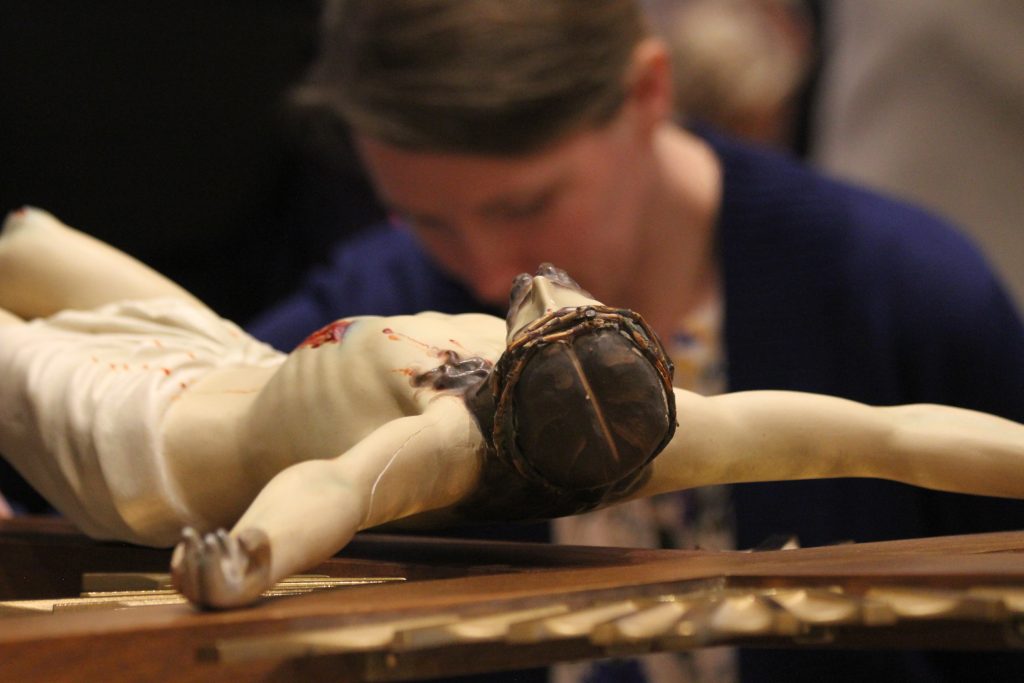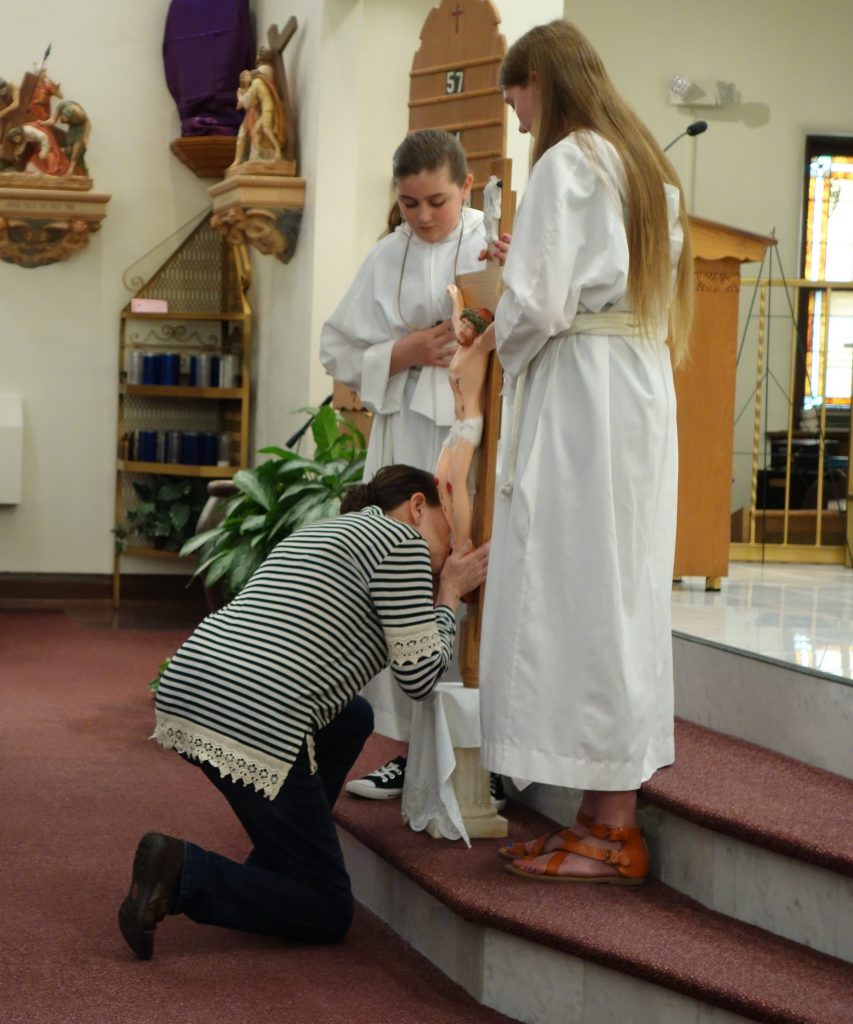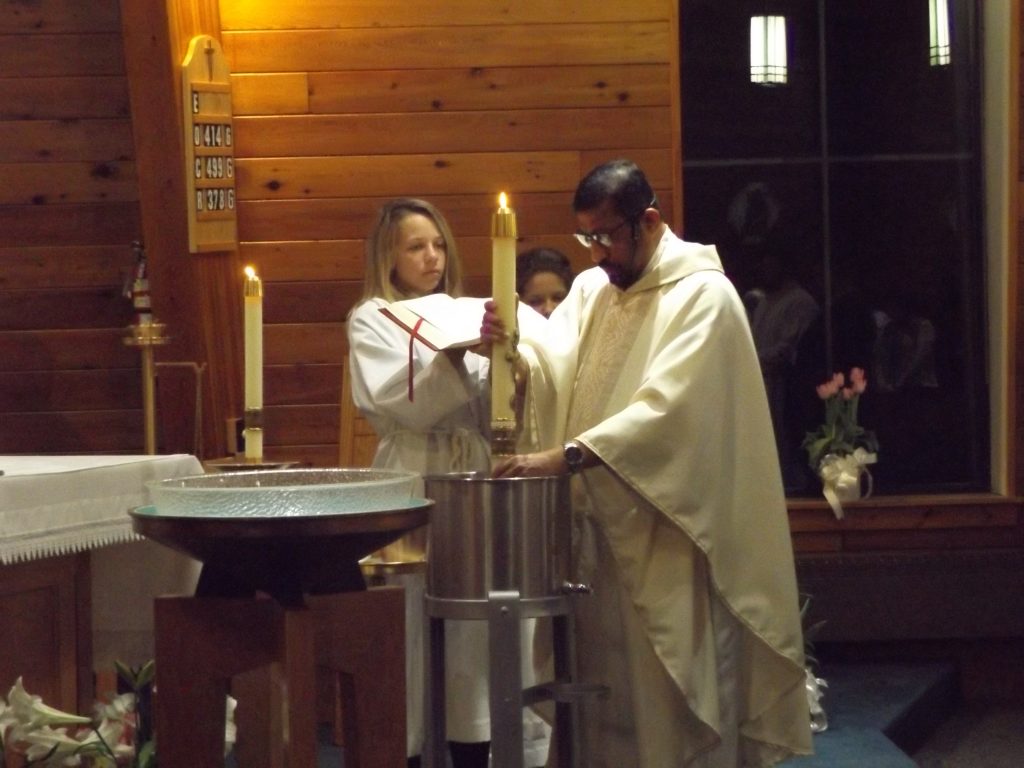April 23, 2019 // Bishop
The Triduum — Given up unto death … the Son of God brings new life to all mankind
Jesus’ love remembered on Holy Thursday
Bishop Kevin C. Rhoades began the celebration of “the holiest three days of the year” with Mass at the Cathedral of the Immaculate Conception, Fort Wayne, on Holy Thursday, April 18. He was joined by Father Jacob Runyon, rector of the cathedral; Father Peter Dee De and Father Silvino Ndayambaje parochial vicars; and Father Thomas Lane, professor of Sacred Scripture at Mount St. Mary’s Seminary, who concelebrated, as well as some of the seminarians of the Diocese of Fort Wayne-South Bend, who assisted.
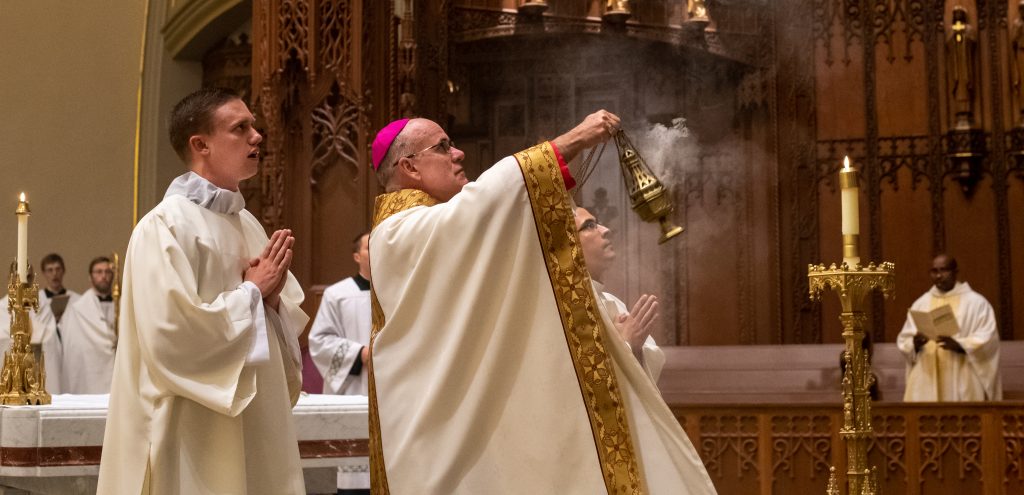
Bishop Kevin C. Rhoades incenses the crucifix at the start of Holy Thursday Mass at the Cathedral of the Immaculate Conception, Fort Wayne, April 18. Also, pictured, from left, are Deacon Daniel Niezer and Deacon José Arroyo. — John Martin
He also welcomed, during the Mass, the 12 young adults who would be participating in the washing of the feet after the homily. All were pilgrims who accompanied him on the World Youth Day pilgrimage to Panama in January.
The bishop explained that Holy Thursday begins the sacred Paschal Triduum, the “culmination of the entire liturgical year.” The celebration of the Triduum — Holy Thursday, Good Friday and Holy Saturday — reveals the mystery of God’s love “its totality during these three days when we celebrate that dying, Christ destroyed our death, and rising, He restored our life.”
While the mystery of God’s love is revealed during the three days, the story begins at the Last Supper with the washing of the disciples’ feet and the institution of the Eucharist. The bishop reflected on these acts throughout his homily.
“When you think about it, the whole of Jesus’ ministry is represented in the washing of the feet,” Bishop Rhoades said.
Before washing the disciples’ feet, Jesus took off His outer garments. This might seem insignificant, but nothing is insignificant in St. John’s Gospel. This action shows Jesus emptying Himself, just as “the Son of God did at the Incarnation, when He came down from His divinity into humanity,” he explained.
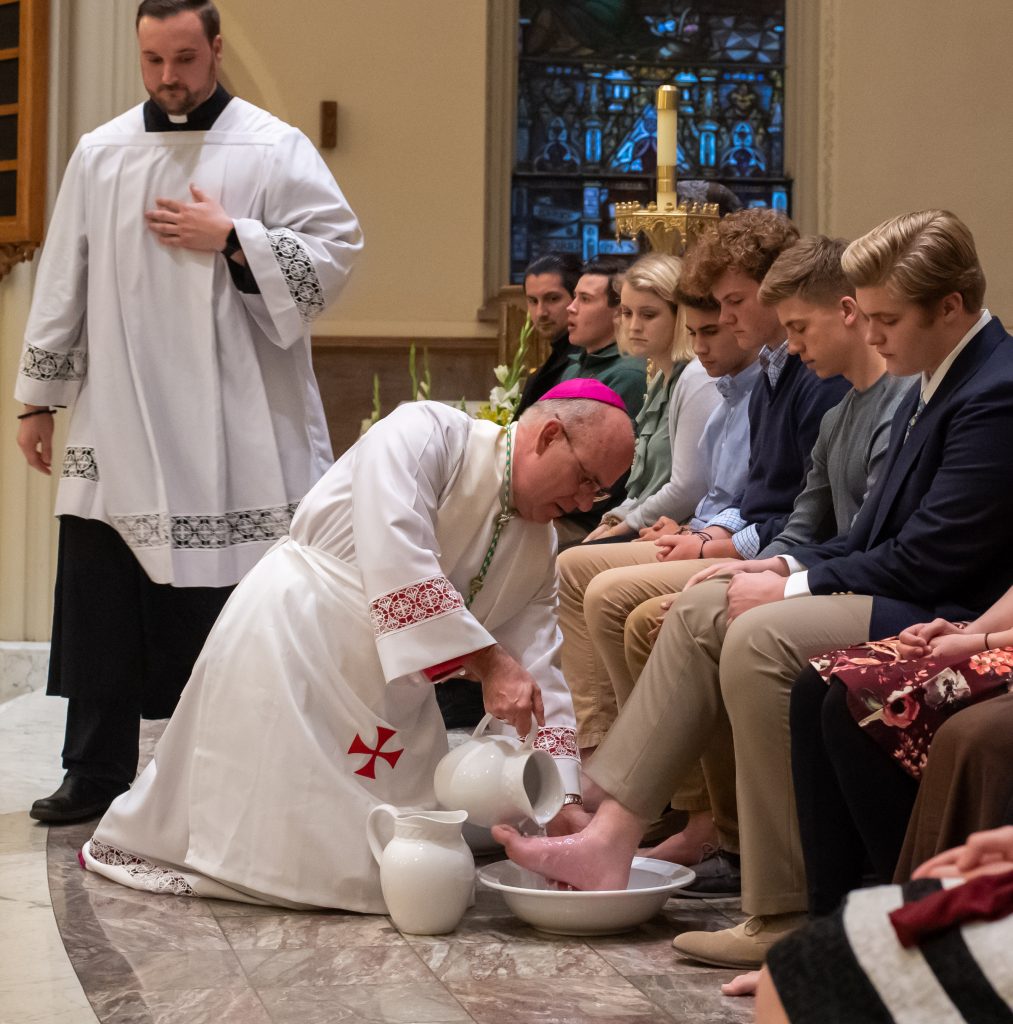
Imitating the example of servant leadership demonstrated by Christ at the Last Supper, Bishop Rhoades washes the feet of young people who deepened their faith this winter by making a pilgrimage to World Youth Day in Panama. — John Martin
The bishop cited St. Paul’s letter to the Philippians, which says that “‘Christ Jesus, though He was in the form of God, did not regard equality with God something to be grasped. Rather, he emptied himself, taking the form of a slave, coming in human likeness.’ Jesus took off his outer garments. He divested Himself of His divine splendor and became man” in the removal of those garments.
The bishop continued to explore the passage in St. Paul’s letter, saying, “Christ humbled himself, becoming obedient to the point of death, even death on a cross.” This passage is what the washing of the feet is all about, as Jesus emptied and humbled Himself to kneel before each disciple to wash their feet.
The washing of the feet also points to what would happen on Good Friday, the bishop said. Jesus wanted to wash away the disciples’ sins, which He did not only by washing their feet but also by dying on the cross.
Just as He desired this for His disciples, the bishop continued, “this is what Jesus desires to do for us.”
Being able to join Jesus in heaven requires that we be cleansed first. “This cleansing, of course, takes place at baptism and every time we go to confession. We say ‘yes’ to Jesus’ love and receive His mercy. It’s His love on the cross that purifies and sanctifies us. Water and blood flowed from His pierced heart — the water that cleanses us, the blood that redeems us.”
He transitioned to the other important event of Holy Thursday, the institution of the Eucharist, noting that the washing of the feet and the sacrament of the Eucharist “are two expressions of one and the same mystery of love,” which is “Jesus’ loving us to the end in His Passion and Death.”
The Eucharist was instituted as a pledge of Jesus’ love. When offering the Eucharist and saying, “do this in remembrance of me,” Jesus is telling His followers to remember His love for them.
“And not only do we remember what Jesus did at the Last Supper and on Good Friday, we actually participate in His great sacrifice of love,” Bishop Rhoades said. “At every Mass, Christ gives us the very body which He gave up for us on the cross and the very blood which He poured out for us for the forgiveness of our sins.”
This institution of the Eucharist along with the washing of the feet are acts of humility, the bishop added. The Eucharist is “an act of incredible humility” as well as “the sacrament of divine humility” with Jesus becoming present in the forms of bread and wine.
The bishop ended his homily by emphasizing the connection between these acts of humility. “Jesus says: ‘If I, the master and teacher, have washed your feet, you ought to wash one another’s feet.’ Jesus is commanding us to practice the self-emptying humility and love that He shows us on the cross. This is the new commandment given by Jesus later in John’s Gospel when He says: ‘Love one another as I have loved you.’”
“Jesus is commanding us to practice the self-emptying humility and love that He shows us on the cross,” Bishop Rhoades said. “Pope St. John Paul II wrote that our ability to go and do likewise in imitation of Jesus’ washing of the disciples’ feet is the “criterion by which the authenticity of our Eucharist celebrations is judged.”
Good Friday — Christ’s Passion
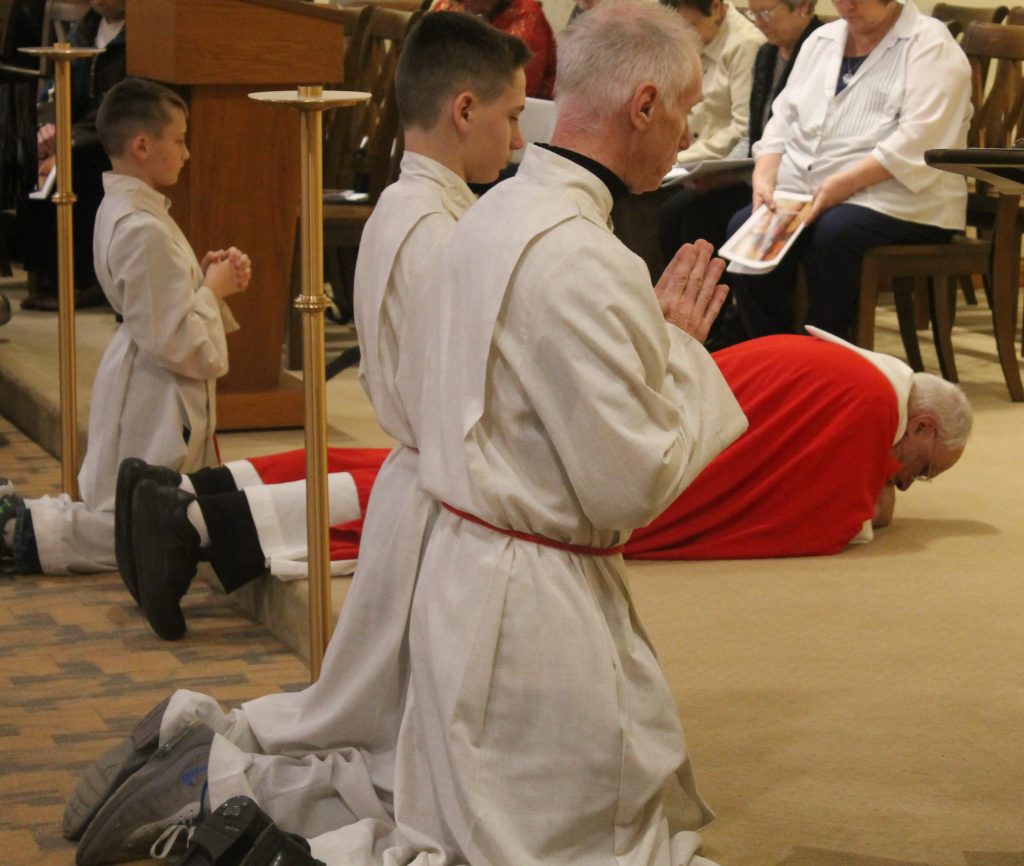
Somber humility marked the beginning of Good Friday service at Immaculate Conception Church, Auburn. — Bethany Beebe
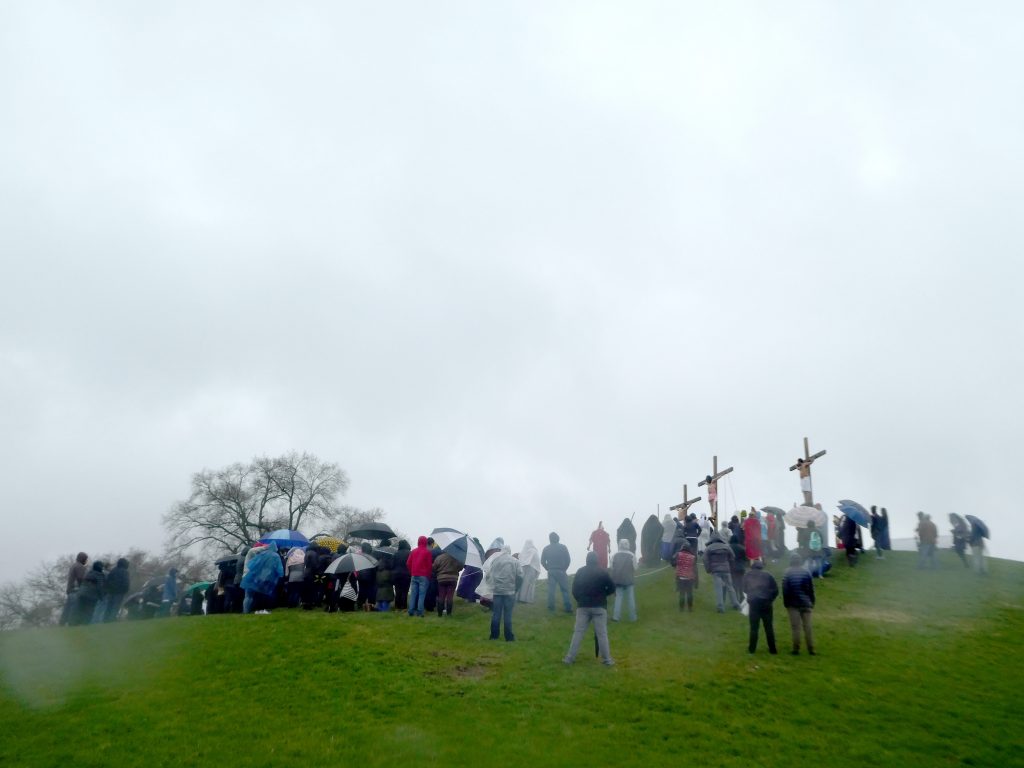
The Grupo Matrimonial of St. Adalbert and St. Casmir parishes, South Bend, also presented its annual, live Way of the Cross on Olive Street and throughout the surrounding neighborhood on Palm Sunday. Husbands and wives together worked to offer a moving and tear-filled presentation of Christ’s Passion. — Jennifer Miller
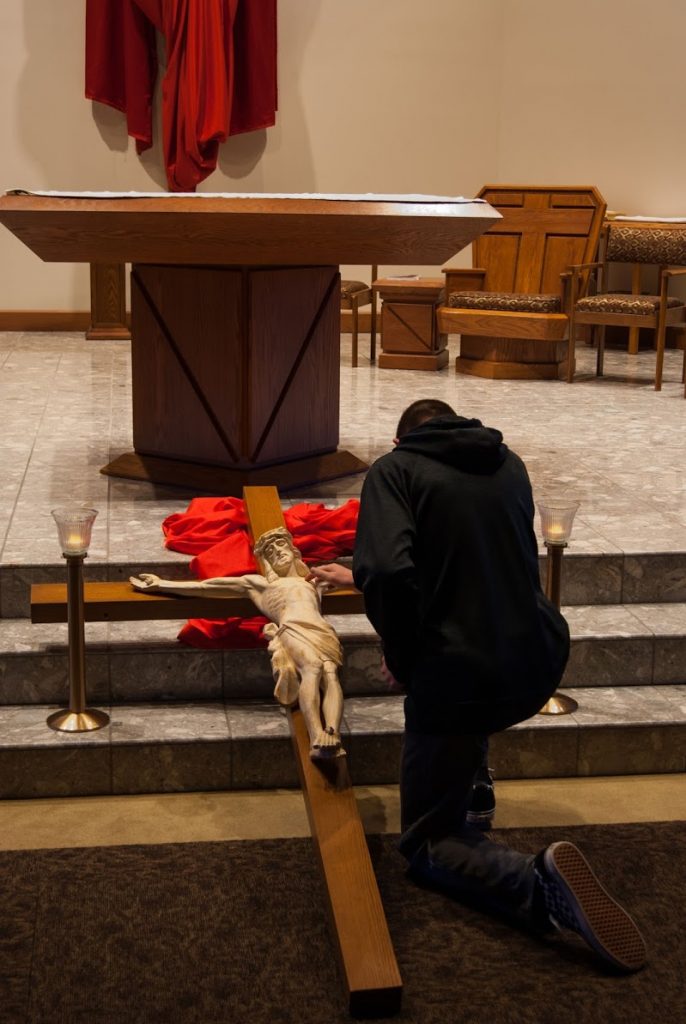
Veneration of the cross took place at parishes across the diocese on Good Friday, including at St. Elizabeth Ann Seton, Fort Wayne, where a figure kneels after the service. — Steve Conte
Easter Vigil
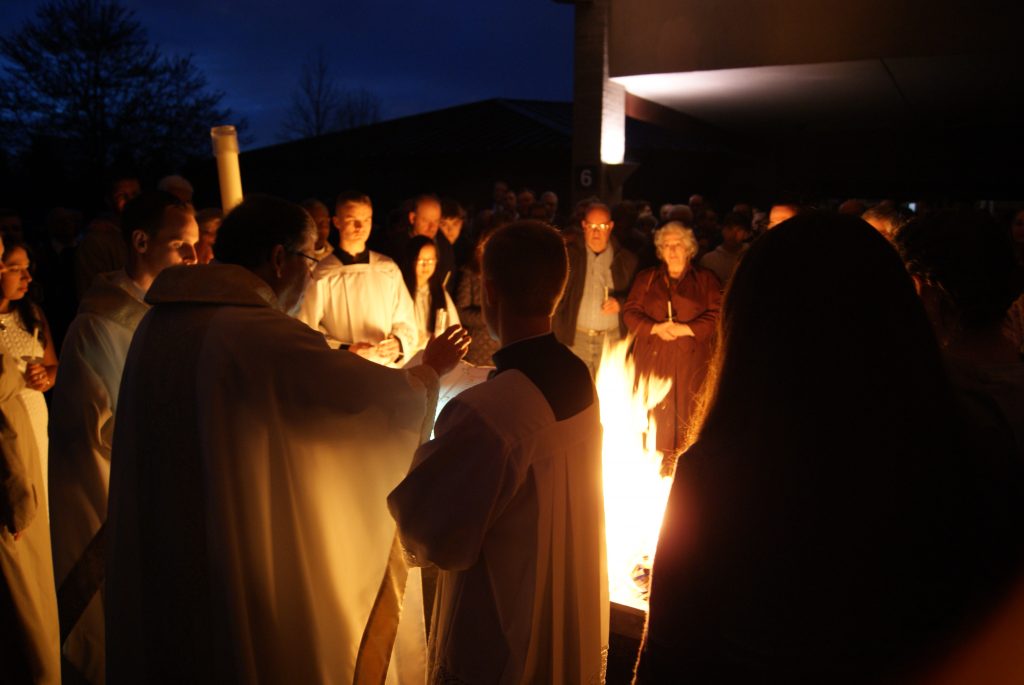
Father David Voors, pastor of St. Elizabeth Ann Seton Parish, Fort Wayne, blesses the new fire at the start of the Vigil Mass on Holy Saturday. — Steve Conte
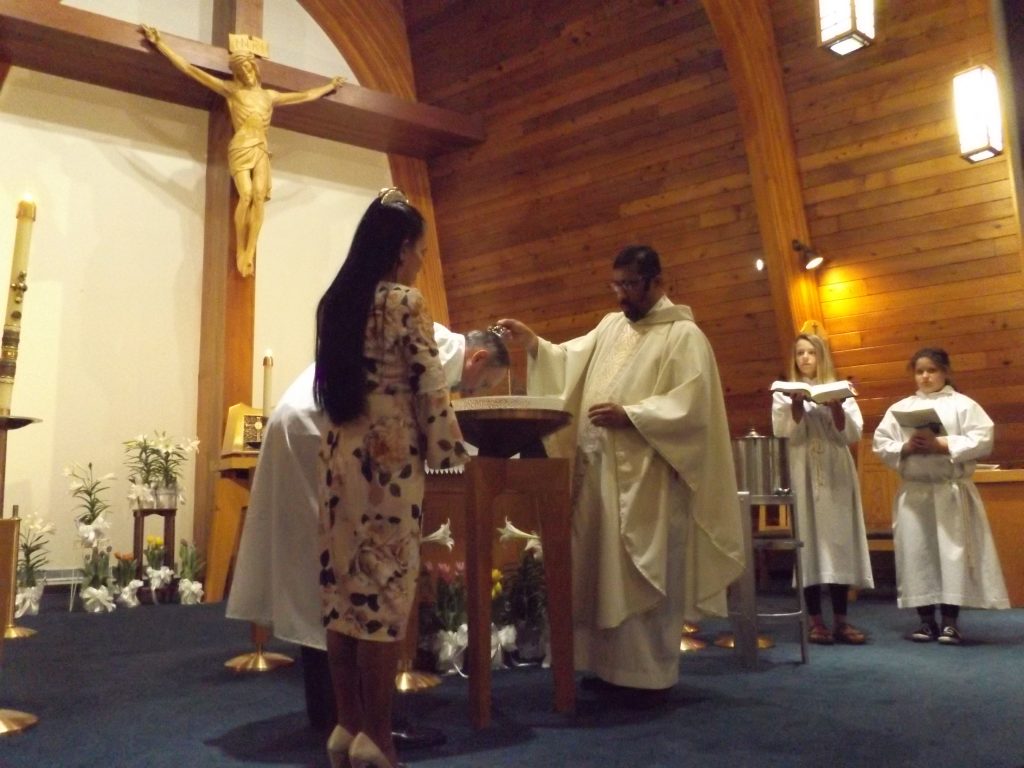
Father Nazareth baptizes catechumen David O’Connor as his sponsor, Maribeth Searer, looks on. O’Connor was baptized, confirmed and received his first holy Communion during the Easter Vigil Mass and entered into a convalidated marriage. — Denise Fedorow
The best news. Delivered to your inbox.
Subscribe to our mailing list today.







